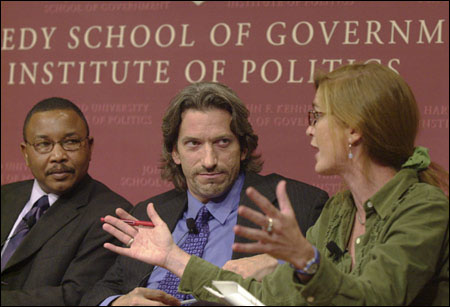Forum panel assails Sudanese government
Experts gather to discuss genocide in Darfur region of Sudan

A panel of human rights activists condemned Sudanese government-sanctioned genocide that has left 1.5 million black Africans in Sudan’s Darfur region homeless and 70,000 dead.
The panel discussion, “Darfur: How to Respond to Genocide,” which took place Monday night (Oct. 18) at the John F. Kennedy Jr. Forum, examined solutions for solving the immediate humanitarian crisis in Sudan as well as developing long-term strategies for establishing peace.
The world has stood by, said the panelists, while the Sudanese government, in alliance with bands of militia groups (called janjaweed) have systematically raided villages in the Darfur region – torching homes and slaughtering and raping villagers. Tens of thousands Darfurians have died, more than 1.2 million have been internally displaced, and 300,000 have fled to refugee camps in neighboring Chad.
Providing security is central to ending the immediate suffering, said Omer Ismail, director of Darfur Peace and Development. “There is no security for the people in the camps. The people cannot venture a few yards out of the IDP [internally displaced persons] camps.”
“The first things one has to say about them [the Sudanese government] is, they’re damn good and they’re very seasoned at framing their counterinsurgency strategies, which usually take the form of ethnic cleansing or genocide, in ways that make it look like someone else is the problem and they’re the solution,” said Samantha Power, a lecturer at the Carr Center for Human Rights Policy and author of the Pulitzer Prize-winning book “A Problem from Hell: America and the Age of Genocide.”
“They did a masterful job framing the question as if there was this sort of unruly, uncontrolled group of elements out there that just needed to be incapacitated and neutralized,” Power continued, “rather than framing it … as a Sudanese government assault, ethnic cleansing campaign that happened incidentally to use men on camel backs as their proxies.”
John Prendergast, special adviser to the president of the International Crisis Group, said the United States must push for increased security for the refugees. The United States and its allies also must hold the Khartoum regime accountable for the atrocities it has committed, and appoint an international commission of inquiry to decide if what has transpired in Sudan is genocide and whether crimes of war have been committed. Sanctions such as freezing the assets of companies controlled by the ruling party, travel bans for senior officials, and an arms embargo, also should be put in place.
“When they look in the mirror in the morning and ask, ‘Are we going to slaughter people today?’ they would have to know that finally the cycle of impunity may be broken – that finally there will be a cost to their actions,” said Prendergast.
Only a series of integrated solutions that includes intervention will succeed, according to Romeo Dallaire, former force commander of the United Nations Mission to Rwanda. Dallaire proposed two forms of intervention: 24,000 to 44,000 troops for intervention and protection or 4,000 to 10,000 troops to establish a moral presence in the area.
In moving forward in establishing long-term, enduring solutions, the United Nations will need to take the lead, said Prendergast. That would include the development of a comprehensive peace process that would allow people “to be able to go back to their homes safely and securely.”
The “weak link” in this process, said Dallaire, are the middle powers – the Germans, Japanese, Canadians, Dutch, Scandinavians, and Australians – “who are standing on the sidelines and doing nothing. They are either riding the coattails of the big powers or they are staying aloof. They have got to step up and start providing assets to Kofi Annan [UN secretary-general] to provide support. If the middle powers do not participate in this exercise, the African union will fail. Khartoum will continue, and ultimately, more and more people will all die.”
The panel discussion, which was moderated by Michael Ignatieff, director of the Carr Center for Human Rights Policy, was co-sponsored by the Carr Center for Human Rights Policy, the KSG Human Rights Professional Interest Council, the KSG International Security and Diplomacy PIC, and the KSG Negotiation and Conflict Resolution PIC.




